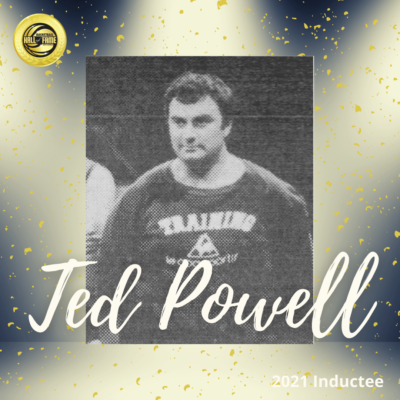Ted Powell’s basketball legacy in South Australia is an amazing story that covers everything from venue management, to junior coaching, to senior coaching and to being the driving force behind what now is the burgeoning competition known nationwide as the Women’s National Basketball League.
It truly takes in an extremely broad range of basketball-related activities but undoubtedly his greatest single achievement was the inauguration and launch of the WNBL, a challenge he took on after coaching West Adelaide’s women’s team to the 1980 SA Championship.
Powell inherited the Bearcats’ senior women’s team from Terry Aston and took his beloved Bearcats to SA championships in 1980-83-87 and also into the 1985 WNBL Final and Australian Club Championship Final that same year.
The men’s NBL launched in 1979 and Powell, always a strident equal opportunity advocate, decided it was time a genuine effort was made to establish regular interstate competition between women’s club teams as well.
Until then, the only arena for interstate club interaction was either the Australian Club Championship – an annual four-day tournament featuring the 24 best clubs from around the nation, with the host venue rotating between Sydney, Melbourne and Adelaide – or various popular minor tournaments such as the Warrnambool Seaside Classic around Australia Day, or Swan Hill’s annual New Year’s carnival.
The Australian States Championship, a weeklong carnival contested annually between senior state teams, also still was in operation. The problem with this competition was it only catered for the 10 selected elite players of each state.
“We were looking to raise the level of club competition by regularly playing against the best from interstate,” Powell said years later when recalling how it all began. All that existed at the time were repetitive and one-dimensional state leagues.
Powell sounded out fellow South Australian coaches Kay McFarlane of North Adelaide Rockets and Brendan Flynn of Noarlunga City Tigers about a concept involving the three SA teams and three leading Victorian clubs, St Kilda, CYMS and Telstars competing in a regular interstate competition.
The initial name for what would become the WNBL was the Southern Conference Big Six, Powell also engaging St Kilda women’s coach Bill Palmer in the ongoing dialogue.
Buoyed by his support, Powell immediately contacted McFarlane and Flynn to arrange a lunch meeting at the Governor Hindmarsh Hotel in Adelaide to discuss the next steps.
By the time the 1980 Australian Club Championship in October in Sydney came around, NSW teams Sutherland and Canterbury-Bankstown were also invited.
In Warrnambool on Sunday, January 25, 1981, the eight-team competition was ready for its June launch as the “Women’s Interstate Basketball Conference.” The Australian Institute of Sport had the funding to also jump aboard and did just that, the league launching on Friday, June 19, 1981 when the AIS played in Adelaide.
Powell’s vision and more, his determined intent to make it happen, had created a league and it now was underway.
He coached West Adelaide Bearcats’ WNBL team from 1981-1991 and made sure his club conducted itself in the most professional possible manner.
Team photos, publicity, stats – Powell drove it all and on out to the general news media, when he wasn’t out chasing sponsorships or coaching his ball club. He was committed and fulltime in every sense.
On court his Bearcats were WNBL semi finalists in 1981-82 and a grand finalist in 1984.
Powell loved and respected the burgeoning new league, whether West was at Bowden, then Athol Park or Apollo Stadium and he again drove pre-game meals for sponsors, media and friends, and post-game functions for all of the above, plus the players.
He was ahead of his time.
But not only is he credited with tipping off the sport’s most important women’s league and thereby building the game at the top end, he also was responsible in 1976 for bringing mini-ball to South Australia, revealing and reinforcing his passion for the sport at the grassroots level.
Powell also “discovered” one of South Australian basketball’s greatest ever players, Hall of Famer Rachael Sporn, brought some of the first quality American imports – such as Rhonda Corkeron (nee Bates) – into the sport and played a major role in the careers of local standouts such as dual-Halls Medallist Cass Pujals (nee Dalton).
Crossing to West Adelaide from Sturt to take up managing the club’s Bowden Stadium headquarters, Powell first was a distinguished junior girls coach.
He coached West’s under-16 girls to the National Classic title in 1980 and was South Australia’s under-16 state coach in 1976-77-78, winning the national championship in 1977.
He held the role of under-18 SA state coach in 1971-79-80-81 and was West Adelaide Junior Coaching Director from 1977 to 1992.
A two-time State senior coach, Basketball Association of SA Coach of the Year in 1987, a WNBL Award of Merit in 1995, a WNBL Executive Member from 1980 to 1984, Powell was awarded WNBL Life Membership in 2001.
In 2013 when West Adelaide Bearcats Basketball Club inaugurated its Hall of Fame, Powell was an automatic inductee and immediately afforded “Legend” status, the highest honour the club could award.
He continued to coach at senior (now NBL1 Central) level in South Australia after his tenure at West ended, successfully steering Central District Lions into a preliminary final and turning Murray Bridge Bullets into a competitive force.
He won a further Coach of the Year accolade along that journey.
Powell passed away in 2019 at 75 but his is a lasting legacy to the sport in Australia and as an inductee into the Basketball SA Hall of Fame, he is long overdue.
